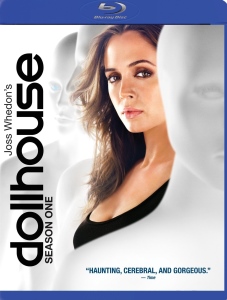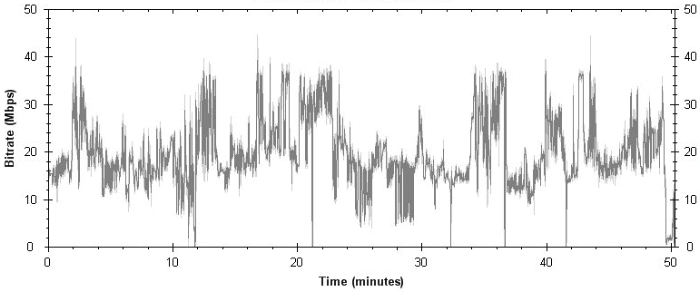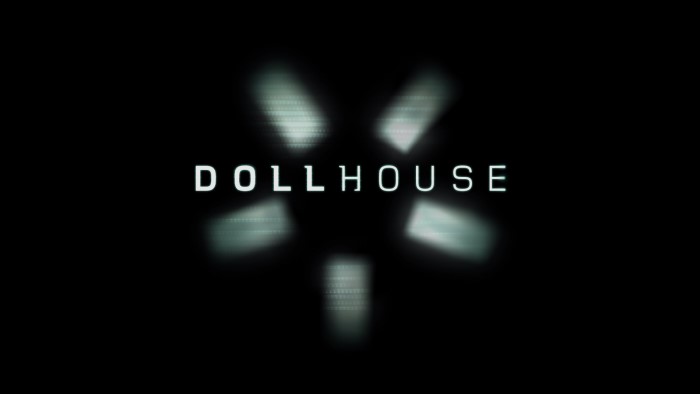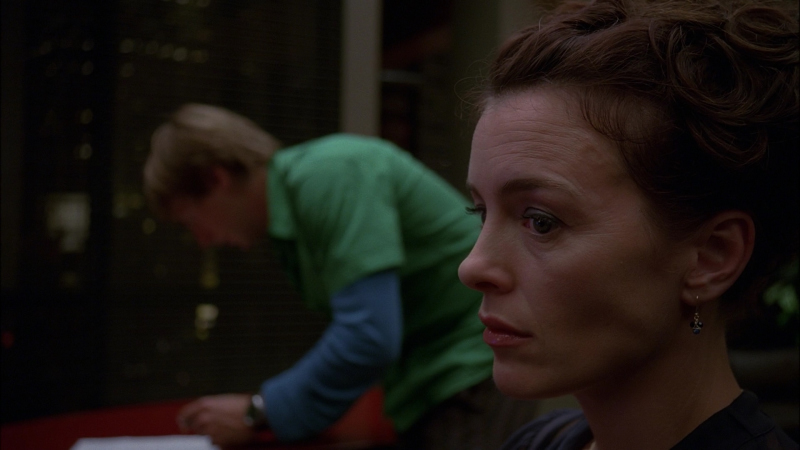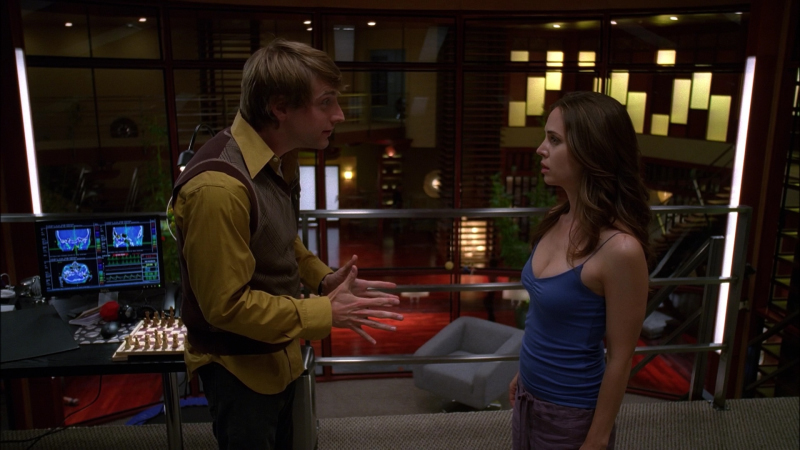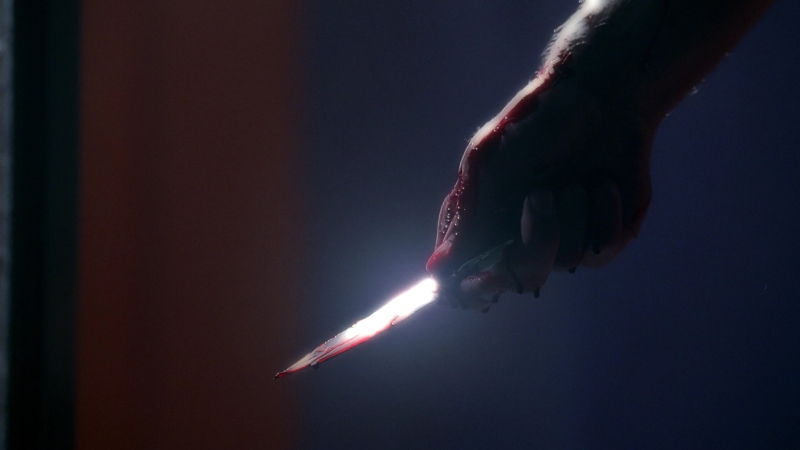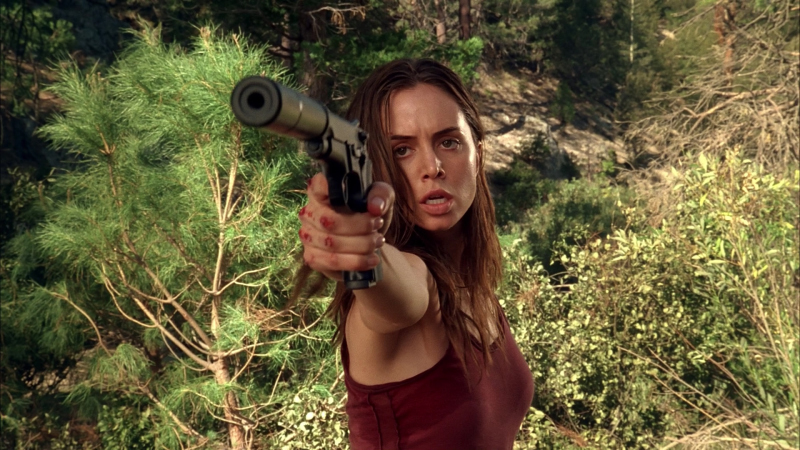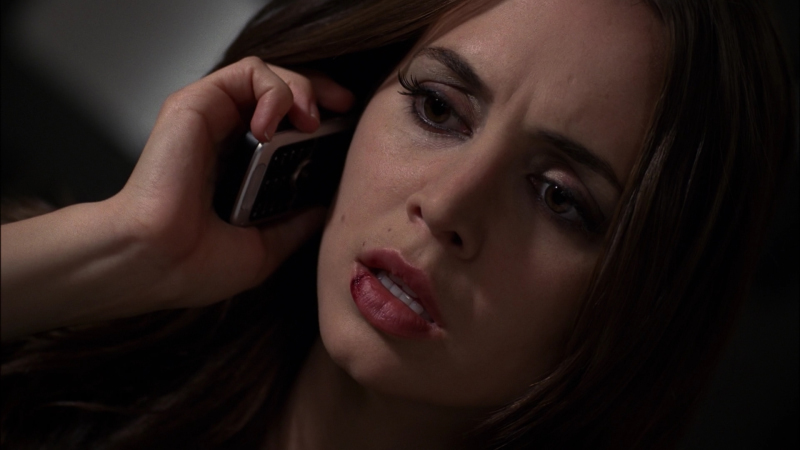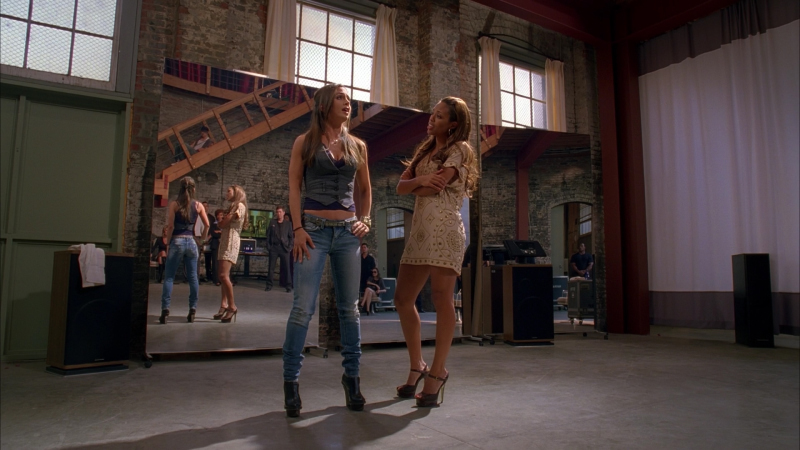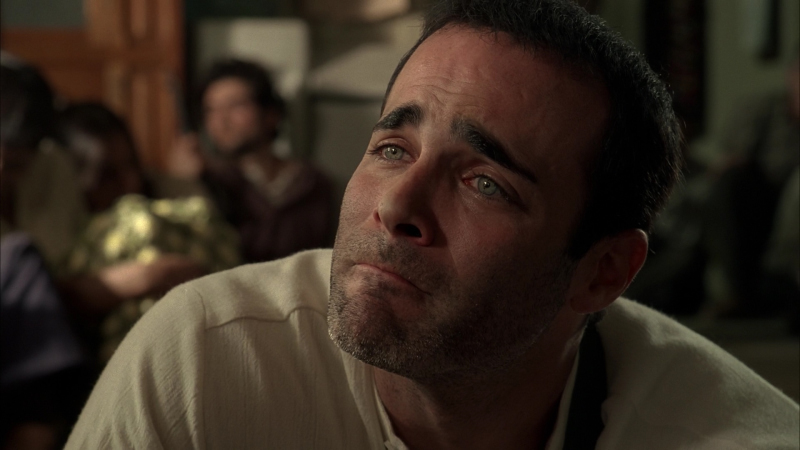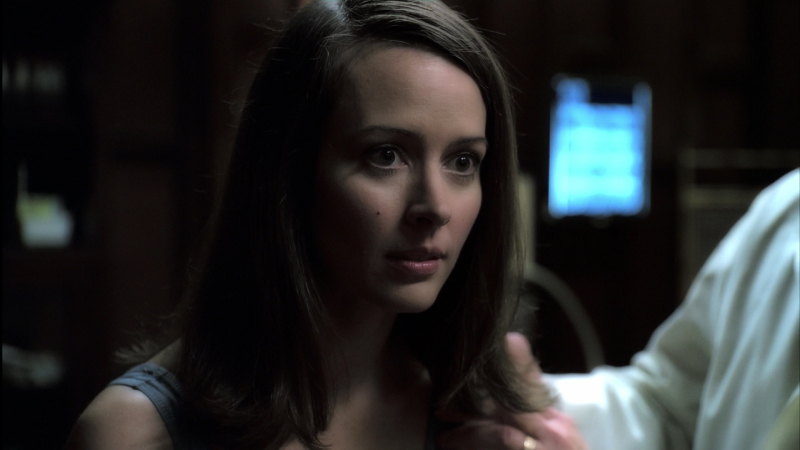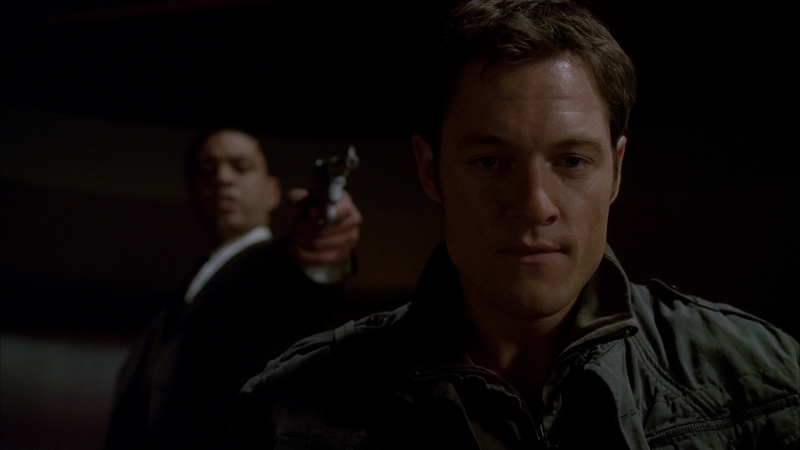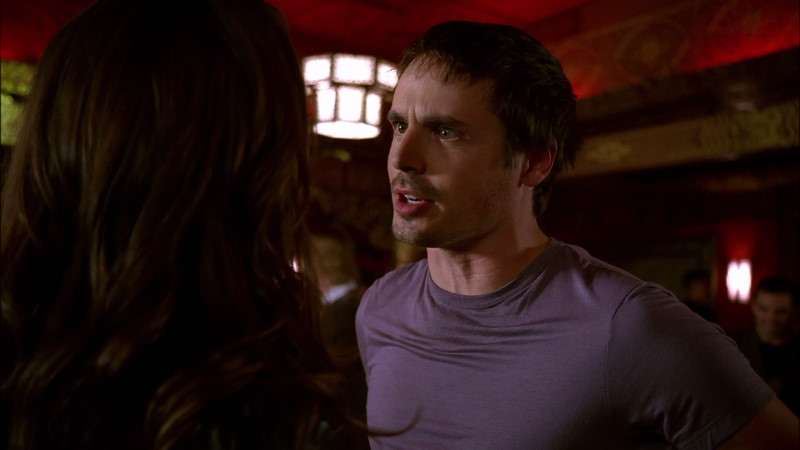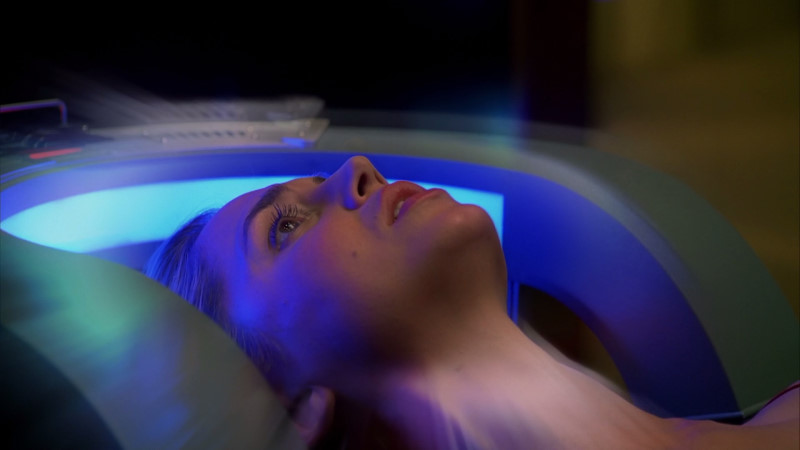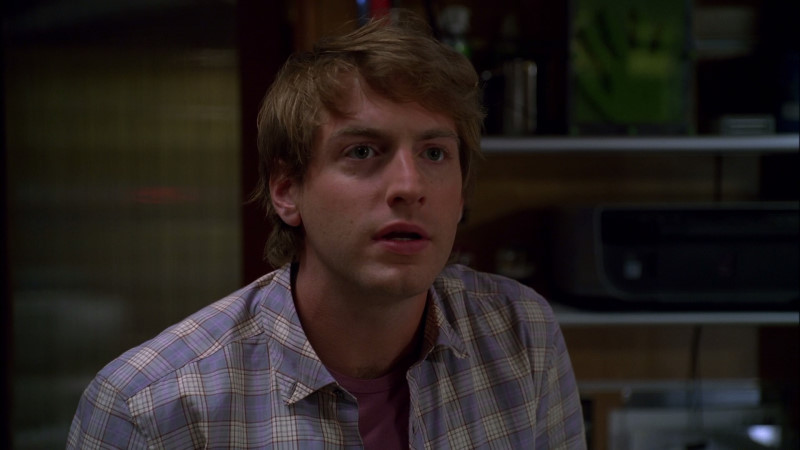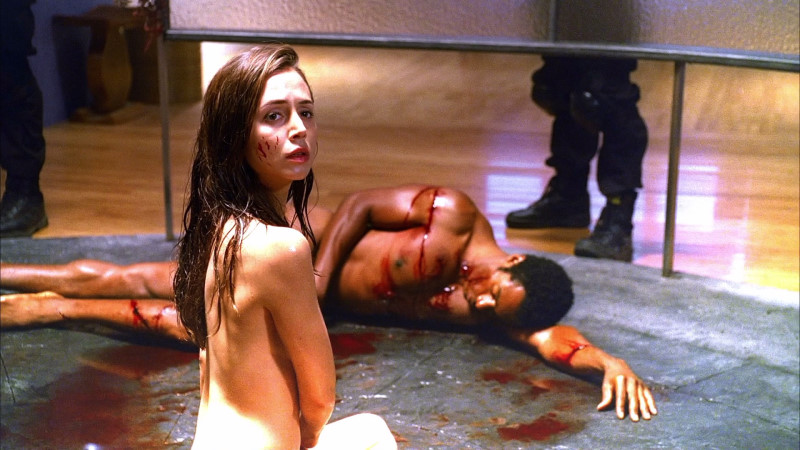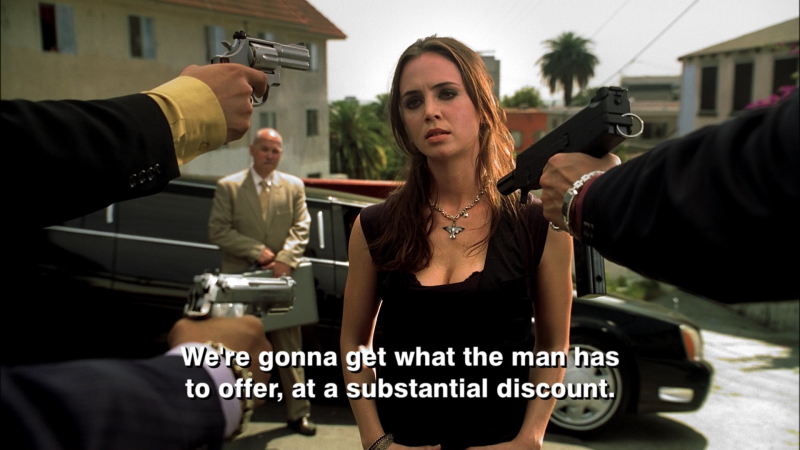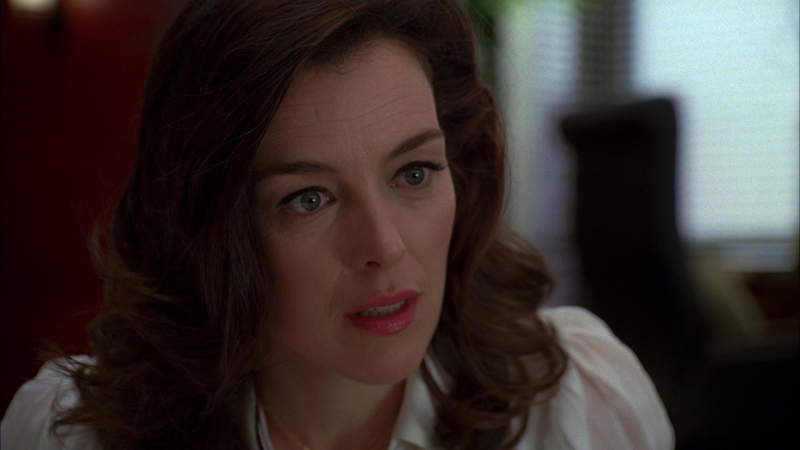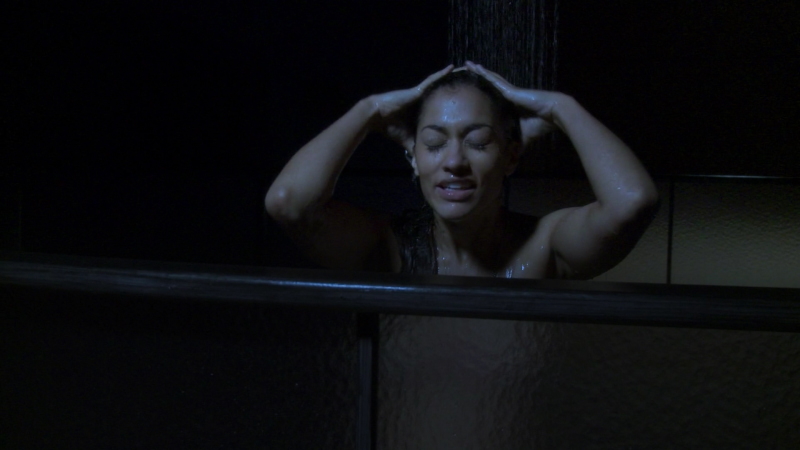|
Dollhouse
Season One [Blu-ray]
(Created
by Joss Whedon, 2009)
Review by Leonard Norwitz
Studio:
Television: Fox
Video: 20th Century Fox Home Entertainment
Disc:
Region: ALL
(as verified by the
Momitsu region FREE Blu-ray player)
Runtime: 0:50:17.055 X 12 plus two bonus episodes
Disc One Size: 48,373,768,603 bytes
Feature Average Size: 9,816,188,928 bytes
Average Bitrate: 19.69 Mbps
Chapters: 12 each episode
Case: Standard Blu-ray case
Release date: July 28th, 2009
Video:
Aspect ratio: 1.78:1
Resolution: 1080p
Video codec: MPEG-4 AVC Video
Sample
Bitrate (disc 1-episode 1):
Audio:
DTS-HD Master Audio English 4374 kbps 5.1 / 48 kHz / 4374
kbps / 24-bit (DTS Core: 5.1 / 48 kHz / 1509 kbps / 24-bit)
Dolby Digital Audio English 224 kbps 2.0 / 48 kHz / 224 kbps
Subtitles:
English (SDH), English, French, Portuguese, Spanish, none
Extras:
• Unaired Pilot Episode "Echo" – in HD
• Audio Commentary on Selected Episodes by Joss Whedon,
Eliza Dushku and others.
• 23 Deleted Scenes – in upscaled raw HD (29:46)
• Making Dollhouse – in HD (20:48)
• Coming Home – in HD (7:11)
• Finding Echo – in HD (5:07)
• A Private Engagement – in HD (5:47)
• Designing the Perfect Dollhouse – in HD (5:59)
Exclusive to Blu-ray:
• Episode 13 "Epitaph One" – in HD
Comment:
The Series: <7
I feel a long-suffering compulsion to begin my comments with
a rant about the opening credits: Part of what I want to
say applies to a great many television shows, and has been
the case for a considerable time: and that is the practice
of not identifying the principle actors except by name: no
images of their character and no cast credits at the end.
So, while SAG gets its day in the limelight, the audience is
left in the dark as to who these people are. In the case of
new shows with fresh casts, we are left to ask: Who are
these guys? In the case of Dollhouse, the situation
is abetted by the fact that several of the main actors’
names are not even identifiable by gender, at least not to
the average North American man or woman on the couch, making
it all the harder to make an educated guess. If you didn’t
already know, what would you have made of “Tahmoh” “Enver”
“Dichen” or “Fran”?
The most effective way around this would be to offer a
credit montage that shows the named actors in character. . .
which leads me to gripe #2: The title of this show is “Dollhouse”
not “The many faces of Eliza Dushku” More
established lead actors of other series are willing to share
the opening credits with their colleagues – why not Eliza?
Worse yet, the montage fails to convey the meaning of the
title. By the way, why not include the title of the
specific episode – who so elusive? End of rant.
It’s been some five years since Joss Whedon has had a series
on network television. First there was the popular and
critical success, Buffy the Vampire Slayer, which I
and others with far more impressive cred’s continue to
consider as one of the best drama series on television –
ever. Joss’s spin-off, Angel, ran successfully for
some five seasons, but got into trouble once someone got the
not very bright idea to make Cordelia a god of sorts. Then
there was the short-lived space western, Firefly,
which Fox placed ignominiously in the attic in
mid-sentence. Joss replied with his feature film,
Serenity.
Fast forward to February 2009, after hesitations and memos
on the part of the network and other interested parties,
Dollhouse aired its second attempt at an approved
pilot. Immersed in controversy about its alleged misogynist
theme, the series did not find its mission or its proper
voice until Episode 6 (Man in the Street). It
strikes me as – how shall I say it? – bad faith to imagine
that, of all people, Joss Whedon would suddenly have an
anti-feminist meltdown. So I can only conclude that such
reaction is simply political nervousness, fearful that the
network would be deluged with protests and angry letters
from viewers too lazy too stick around long enough to see
what the show is trying to do.
And what is that? At one level, Dollhouse is about
offering very wealthy clients (as well as the occasional
pro bono assignment) the fulfillment of their most
personal fantasy – or: need, as it is sold by Adele DeWitt
(Olivia Williams), the director of just one of several such
Dollhouses throughout the world. That fantasy will involve
the participation of a Dollhouse "Active" – a man or woman,
who has "voluntarily" given up their personality for five
years in exchange for a series of exciting assignments
(which they won't remember anyway). At another level,
Whedon asks all the right questions about needs and desires,
informed consent and coercion, slave and master, wealth and
power.
As for the plot, there are three –make that, four – main
arcs: the one involving the Active called "Echo" (Eliza
Dushku), whose core personality cannot be completely erased
and who seems to catalyze other more pliant Actives even in
their dormant state. Another follows FBI agent Paul Ballard
(Tahmoh Penikett) and his endless investigations into a
missing person case – that would be "Caroline" (Ms. Dushku,
again) and the existence of the Dollhouse itself – at this
point in the plot, considered by the general public and
national security agencies little more than an urban
legend.
Then there are the machinations of the particular Dollhouse
that concerns us in Season One: the science team led by the
maddenly endearing Topher Brink (Fran Kranz), who makes
certain that memories are erased and new personalities,
complete with the requisite physical and kinetic abilities,
are installed for each assignment; the various Actives – in
addition to Echo, we get to know Victor (Enver Gjokaj),
Sierra (Dichen Lachman) and two others who shall remain
anonymous so as not to spoil the fun of their outing, the
scarred but caring Dr. Saunders (Amy Acker) and the
aforementioned Miss DeWitt. Then there are the "handlers"
who monitor their assigned actives in the field to ensure
that they complete their mission and don't get into any
serious trouble while doing it. Well, it would be a pretty
dull series if these guys weren't kept busy – Boyd Langton
(Harry Lennix), Echo's handler, most of all.
The fourth arc involves the medical research company that
funds the Dollhouses. The fees collected from their clients
pays for the research, but we are led to believe there is
another agenda lurking in the wings.
So much for the story. What about the execution? I may be
of a minority opinion but, so far, I find the concept of the
series exceeds its execution. I feel that
Whedon has overestimated
Eliza Dushku's talents. The
pre-2009 Eliza model may be more talented in many areas than
were evident 6-10 years ago: she may be faster, prettier,
and more linguistically capable, but her concentration isn't
as focused and the footage of her dancing with Buffy was
hotter and sexier. Her character on BTVS and Angel was
allowed to take shape over many episodes, even years, and
though we would all agree she nailed Faith from the start,
her writers and directors were able to take the necessary
time to shepherd the actress through Faith's dissolution and
eventual resurrection, so to speak. But here, she is asked
to persuade us that she is a new personality every episode,
yet maintains a vague sense of a core that gradually comes
to learn what she is about.
This would be difficult for any actor, but Eliza really
hasn't the acting chops for this, unlike double-lifers like
Jennifer Garner as Sydney Bristow or Michael C. Hall as
Dexter. Other Dollhouse Actives become their
characters more convincingly, especially
Enver Gjokaj as Victor. Enver
doesn't get as much screen time as Eliza, but whatever new
personality Victor inhabits, he is that character, and we
believe that those around him accept him as such. I often
felt that Eliza was acting the part instead of owning it and
so I would like to believe I would not have asked for my
money back were I a client. In a backhanded complement, I'm
not sure that it serves the series very well that
Olivia Williams is so
mismatched to the rest of the cast. Of the principals, she
is the only serious actor among them. Amy Acker and Enver
do a journeyman job, but most everyone else seems studied
and lacking spontaneity. Alan Tudyk has the opposite
problem – and we are swept along in his tour de force, even
he's more than a little overwhelming.
Remember Marshall Flinkman, the tech wizard from Alias,
and how Kevin Weisman's nervous bits that were at first
endearing eventually became cloying and annoying?
Fran Kranz plays Topher Brink like
Marshall to the third power. My opinion: a kid in a
candy store is not the sort of scientist that the likes of
Adele DeWitt would trust with her store.
A quick word about Tahmoh Penikett: Agent Paul Ballard is
one righteous dude, and Tahmoh plays him that way – but
where did he get that walk! It's like Paul Newman (whom he
resembles, as he does Jean Paul Belmondo with a little
Laurence Fishburne thrown in) crossed with the all-shoulders
walking style of animé figures.
The difficulty with a show where the characters are
constantly changing is that it can devolve into little more
than a series of vignettes – some of which, as occur in "Man
on the Street" and "Omega" are quite good; others, like
"Haunted" and "True Believer" are not at all persuasive.
Still others, like "The Target" and "Echoes" are based on
stories done better elsewhere. It might have helped if the
cast was of more consistent quality or if they were all on
the same page. At times, I doubted they knew what page that
was. The philosophical questions raised are provocative –
and that's a good thing, and the idea of nature finding its
way despite the efforts of science and technology – though
old – is always timely. But Dollhouse still lacks an
emotional core. No doubt this core is evolving (which is
part of its point) – as is evident through the morass of
subplots that nearly come together by t he
final episode.
Image: 7/9
NOTE: The below Blu-ray captures were ripped directly from the
Blu-ray disc.
The first number indicates a relative level of excellence
compared to other Blu-ray video discs on a ten-point scale.
The second number places this image along the full range of
DVD and Blu-ray discs.
With high bit rates in the mid-30s, Fox's image is solid, if
variable, no doubt because of the source material. The
variability tends to be mostly a matter of contrast,
brightness, black levels and shadow detail in ways that are
not entirely explainable by story content. I was not
distracted by artifacts. I generally liked the image which
often has a cinematic feel about it. Yet there is a
softness that pervades – very likely some DNR. One point
off for the inane idea to add faux scan lines to what is
obviously HD video news footage in "Man on the Street":
They even show up on the standard definition DVD.
CLICK EACH
BLU-RAY
CAPTURE TO SEE ALL IMAGES IN FULL 1920X1080 RESOLUTION
NOTE: BIG THANKS
to our good friend Bjørn Erik Hundland for permission
to use the first nine captures below from his site
HD SCREENCAPS located
HERE
Unaired Pilot "Echo" and unaired episode 13 "Epitaph
One":
Audio & Music: 6/6
With most of the content stereo front, there's not much in
the way of specific directional information in the surrounds
(as we should have expected during the kitchen fight between
Ballard and Echo). There's plenty of oomph, bass and
enveloping music cues, even if there's a certain absence of
focus. The surrounds come into play for the sake of spatial
power. Dialogue is a bit wooly at times. Compared to
Dexter, another TV series that doesn't really require a
snappy audio mix, Dollhouse is positively flatulent.
Operations: 4
I found the menu operations frustrating. I'm not a fan of
the hidden agenda type of menu. For example, the only way
you can be sure if an episode has a commentary was to click
on the episode. If it had a commentary, it would bring up a
pop up that says so and you then have the choice of
activating it or not; but if there is no commentary, the
episode would start right off. The Special Features
sometimes indicated commentaries, other times not.
Extras: 8
The big draws here are the two extra features – both in
pretty good HD and very acceptable 2.0 audio. The first is
the Unaired Pilot Episode "Echo" – the one that made Fox
very nervous about what they may have bought into. Episode
13 "Epitaph One" – exclusively on the Blu-ray edition - is a
very different sort of concept in every way, including its
reliance on handheld video, as if being shot by a war
correspondent. The action takes place ten years in the
future when a kind of civil war (I don’t want to give away
too much here) has taken hold and several refugees find
themselves in what remains of the Dollhouse. (I’d better
stop here.) The plan, as I understand it, is that at least
one of these new characters will reappear from time to time
in coming seasons in a flash forward.
There are three commentaries: the first for the aired pilot
"Echo" has Eliza Dushku & Joss Whedon oohing and aahing over
their lovechild and every actor and supporting crew member.
There is the occasional glimmer of useful information – like
why it is that Dr. Saunders’ scars appear raw and angry one
day and almost invisible the next. Whedon solos for the
commentary on "Man on the Street" – here he is more
informative between joking asides, for which he is a
constant source. I was gratified to hear him comment on a
number of the show's technical shortcomings that I noted as
well. His son, Jed, and daughter-in-law Maurissa, comment
on "Epitaph One" (presented in HD with only a Dolby stereo
audio track, as is the original unaired pilot "Echo".)
In addition to 22 (count them!) deleted scenes of about a
minute each in raw HD, there are five featurettes of between
5-7 minutes in variable to poor quality HD. Among other
failures, such as weak contrast, my pet peeve regarding the
now common practice of focusing beyond the person at the
center of attention is taken to new depths of inanity: e.g.
a series of interviews where the focus clearly rests at the
far side of the room – a room with absolutely no interest,
while the person interviewed takes up 2/3 of the frame!
Making Dollhouse is a broad look at how Dollhouse
came into being. Coming Home reunites those who
worked with Joss on previous assignments. Finding Echo
explores how Eliza came to the role. A Private
Engagement queries the cast with the question: Would you
want any part of your personality exchanged? Designing
the Perfect Dollhouse is just what you think it is – it
does it well and in short order.
Recommendation: 7
Being a Joss Whedon fan, and of Buffy in particular,
I had high hopes for Dollhouse, which certainly gets
much better after episode 5. Much better. And by the end
of the season, we're really set up for exciting things to
come in Season Two. Epitaph One, aka Episode 13,
while it strikes us at first as an afterthought or a way to
conclude the series in case it failed to be renewed, offers
Lost-like time shifting possibilities for future
seasons. All of which makes the present season that much
more attractive. The Blu-ray does a fairly good job in
terms of both image and sound (better than the DVD
certainly), though not as well as the best TV series – and
supplies those tasty bonus episodes.
BTW, be certain you have the latest firmware update. Even
so, your player may not be able to play these discs until
your player's manufacturer sorts out Fox's attempts at
keeping pirates at bay by making the rest of us wait for
updates to play catch-up.
Leonard Norwitz
August 1st, 2009
|
![]()
![]()

![]()
![]()
![]()
![]()

![]()
![]()
